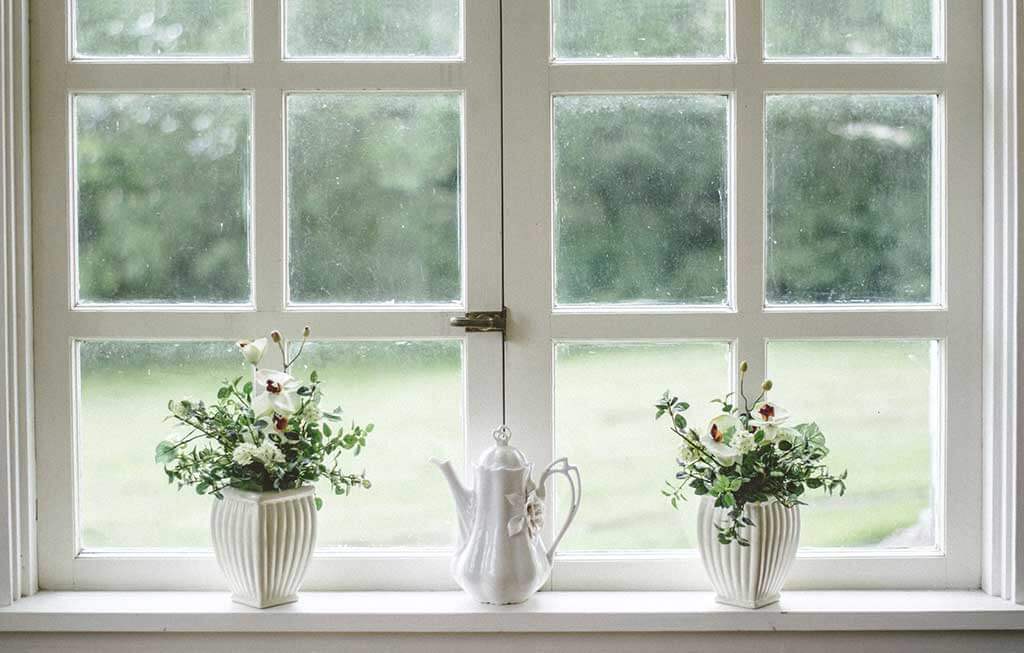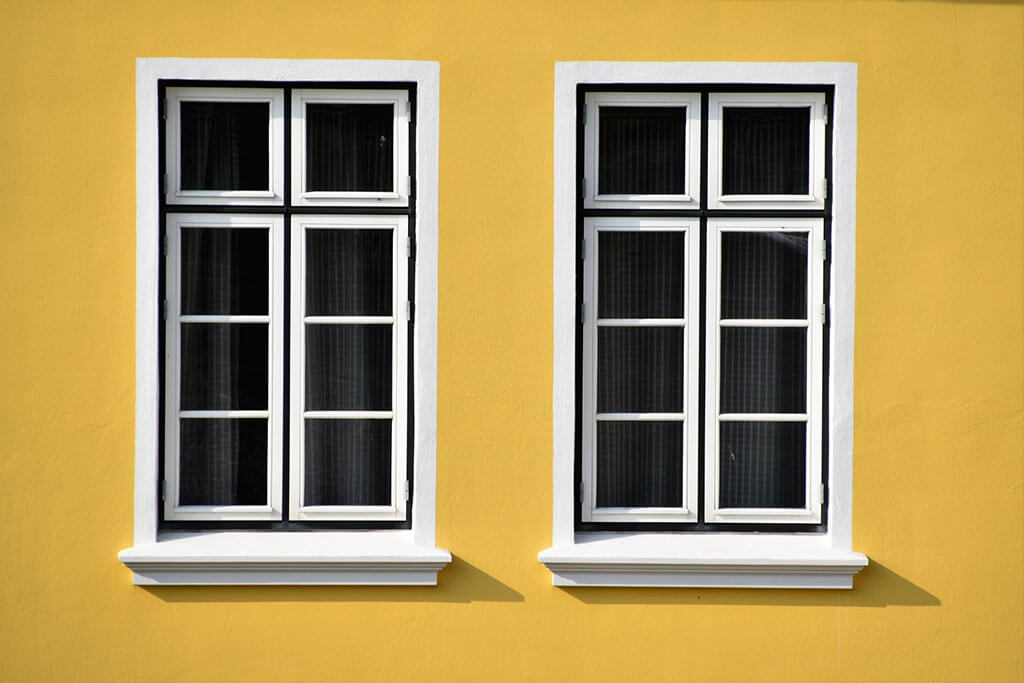Aluminum vs Vinyl Windows: Which is Right For You?

Windows come in all shapes, sizes, and types. Most people rarely pay attention to the materials a window’s frame is made from and only focus on the overall look. However, the materials used can have a significant impact on the window’s cost, lifespan, and ease of maintenance.
Two popular materials for windows are aluminum and vinyl. You may be on the fence about choosing one over the other. Which is why, this guide will compare aluminum and vinyl windows so that you can make a more informed decision about which one to go for.
I. Vinyl Windows

1. What are Vinyl Windows?
Vinyl windows feature frames that are made from poly-vinyl chloride (PVC). These windows emerged in the 1960s and have become incredibly popular in homes across the globe.
① Style of Vinyl Windows
Vinyl windows originally became popular because they offered an alternative to actual wood, which was in short supply after the Second World War. Some of the first vinyl windows featured bright striking colors, and many were designed to resemble painted wood.
These days, vinyl windows resemble wood so closely that many people struggle to tell them apart from the real thing. They maintain their color for many years and experience less frequent cracking problems than their earlier iterations.
② Types of Vinyl Windows
Vinyl windows come in a variety of styles. This includes:
③ How to Install Vinyl Windows
Installing vinyl windows is a straightforward process that is similar to that of other window types. It can be summarized in the following steps:
- 1Clean the window opening and use a vacuum to remove dust and debris.
- 2Apply some flashing tape along the sill and into the corners.
- 3Check that your sill is level and isn’t bowing.
- 4Dry-fit your window frame in the opening
- 5Apply caulk along the interior head at the top of the frame.
- 6Place your window in the opening so that it rests against interior stops.
- 7Install the exterior trim around the window frame and seal the edges using latex caulk.
- 8Add caulk along the window’s interior trim.
2. Vinyl Window Pros and Cons
Vinyl windows offer many advantages over other window types. This includes:
Looking Great
As mentioned earlier, modern vinyl windows resemble wood closely. Actual wood is desirable in homes for its timeless rustic appearance. Vinyl windows do a great job of replicating this appearance, but also come in a wider variety of colors and styles.
Energy Savings
Vinyl windows are known for being energy efficient. They often come with low-emissivity coated glass. However, their frames are often enhanced using foam and also come with warm-edge spacers. All these qualities help reduce heat transfer and how much light passes through.
Homes with vinyl windows remain cool during the summer, and retain heat during the winter. This helps you save on your energy bill.
Low Maintenance
Vinyl windows require little to no maintenance. They can withstand all kinds of conditions and remain virtually scratch-free for much of their life. They won’t need to be painted or stained like ordinary wood does. These windows need to be cleaned only occasionally to maintain their new appearance.
Affordability
Vinyl windows also tend to be among the most affordable window types. They are usually cheaper than both wood and aluminum windows at most retailers.
One might assume this affordability comes at the expense of quality. However, vinyl is a durable material, so even the cheapest vinyl windows offer great value.
The disadvantages of vinyl windows include:
Appearance
Modern vinyl windows do resemble wood quite closely. However, they are still a type of plastic at the end of the day. Keen eyed observers will be able to tell the difference between vinyl and actual wood.
Such problems become a larger issue when adding vinyl windows to old homes. This is because the material cannot be stained or painted to match the interior.
Environmental Problems
Vinyl windows are made from PVC, which is considered one of the most harmful types of plastics. However, they make up for some of their environmental impact by being energy efficient.
Weather Issues
Vinyl windows may start to warp or sage due to heat. This typically occurs for windows that are exposed to direct sunlight for long periods
Ⅱ. Aluminum Windows

1. What are Aluminum Windows?
Aluminum windows feature frames made from aluminum. These windows have been slowly gaining popularity over time. However, they are favored by many homeowners for their sleek and modern appearance.
① Style of Aluminum Windows
Aluminum windows tend to have thinner frames than other window types. This gives them their sleek appearance. However, they are also able to fit larger panes of glass due to this design feature.
② Types of Aluminum Windows
Aluminum windows come in many different styles. This includes:
③ How to Install Aluminum Windows
The installation process for aluminum windows is straightforward. It can be described in the following steps:
- 1Check your window measurements.
- 2Lift the window into place.
- 3Check to see if the window is level.
- 4Ensure the window is flush with the wall.
- 5Attach the window frame.
- 6Attach the window frame’s second side.
2. Aluminum Window Pros and Cons
The advantages of aluminum windows include:
Long lifespan
Aluminum windows boast a longer lifespan than many other window types. They typically last between 20 and 25 years.
Thin Frames
As mentioned earlier, aluminum windows tend to have thin frames. This means they can accommodate large panes of glass. Many people choose aluminum windows to maximize their view and allow more sunlight to enter their residence.
Security
Aluminum is a relatively strong material. This makes it more difficult to take apart or break. As a result, aluminum windows offer great security for homes and commercial buildings.
Environmentally Friendly
Aluminum is often referred to as a “green” metal because it is environmentally friendly. Recycling aluminum saves up to 95% of the energy used to produce it. This makes aluminum windows a great choice for environmentally conscious property owners.
Aluminum windows have the following disadvantages.
Poor Energy Efficiency
Aluminum conducts heat relatively well. This means it may allow heat from outside to enter your home in the summertime, and also allow heat to escape your home in winter. Both these scenarios can raise your energy bill.
Corrosion
Aluminum is considered durable metal. However, it can be prone to corrosion. Such corrosion is especially common in areas near the sea where salt is present in the air and water.
Price
Aluminum windows may be favored for their sleek and modern look. However, they also cost more to manufacture than other window types. This makes aluminum windows a poor choice for those prioritizing affordability.
Ⅲ. Side-by-Side Comparison: Vinyl VS Aluminum Windows
Let’s compare vinyl vs aluminum windows in different areas.
Price
Vinyl windows are the cheaper option, and cost 30-60% less than aluminum windows on average.
Appearance
Aluminum windows do offer a sleek and modern look. They can also accommodate larger panes due to their thin frames. However, some people may prefer the traditional size and dimensions of vinyl windows.
Styles and Sizes
Vinyl windows come in a wider variety of styles and colors compared to aluminum windows. You are more likely to find vinyl windows that match your home’s exterior than aluminum ones in many cases.
Thermal efficiency
Vinyl windows offer better thermal efficiency than aluminum windows due to their insulative properties. This means they can help you save on your energy bill more than aluminum can.
Durability
Vinyl and aluminum windows both offer great durability. However, aluminum windows are more prone to denting and scratching. In addition to this, aluminum windows may experience corrosion in areas with salty humid air.
Installation
Vinyl windows tend to be easier to install due to their flexibility. Aluminum windows are often trickier to install because of their rigidness, which require precise fitting.
Maintenance & Cleaning
Vinyl requires less maintenance and needs to be wiped down or cleaned only occasionally. Aluminum windows have to be cleaned with aluminum cleaner regularly. Their moving parts also need to be lubricated to avoid corrosion.
Ⅳ. Are Vinyl or Aluminum Windows Right for My Project?
Let’s compare whether vinyl or aluminum windows are better for commercial and residential applications.
Commercial
Aluminum windows are favored for commercial use due to their sleek appearance and strength. However, their poor energy efficiency may increase energy bills for commercial property owners or managers.
Residential
Vinyl windows are great for residential use. They come in a variety of styles and colors, require little maintenance, and can be replaced fairly easily.
Final Verdict
As you can see. There are numerous key differences between vinyl and aluminum windows. So consider reviewing this guide before purchasing windows for your upcoming project.
